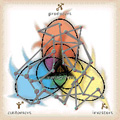Conversations
/“The time has come,” the Walrus said,
“To talk of many things:
Of shoes—and ships—and sealing wax—
Of cabbages—and kings-
And why the sea is boiling hot—
And whether pigs have wings.” - Lewis Carroll
This coming Wednesday evening, twelve of us from the Redwood Coast (Mendanoma) are having a conversation. We don't all know each other but we have one thing in common: we are hungry for real conversations. We're out of practice. We know how to instigate projects and fight battles. We know how to be against things and for things, but really we don't know the art of conversation.
In preparation I have just finished reading a book named: Conversation: How Talk Can Change Our Lives by Theodore Zeldin. "Conversation is a meeting of minds with different memories and habits. When minds meet, they don't just exchange facts: the transform them, reshape them, draw different implications from them, engage in new trains of thought. Conversation doesn't just reshuffle the cards, it creates new cards."
Our first conversation will revolve around "What is conversation?" I guess this is a bit like an Escher design of his Drawing Hands.
What new cards will be created as our Redwood Coast community instigates and practices conversation? What stories and ideas will unfold? What difference will this small effort make over time?


